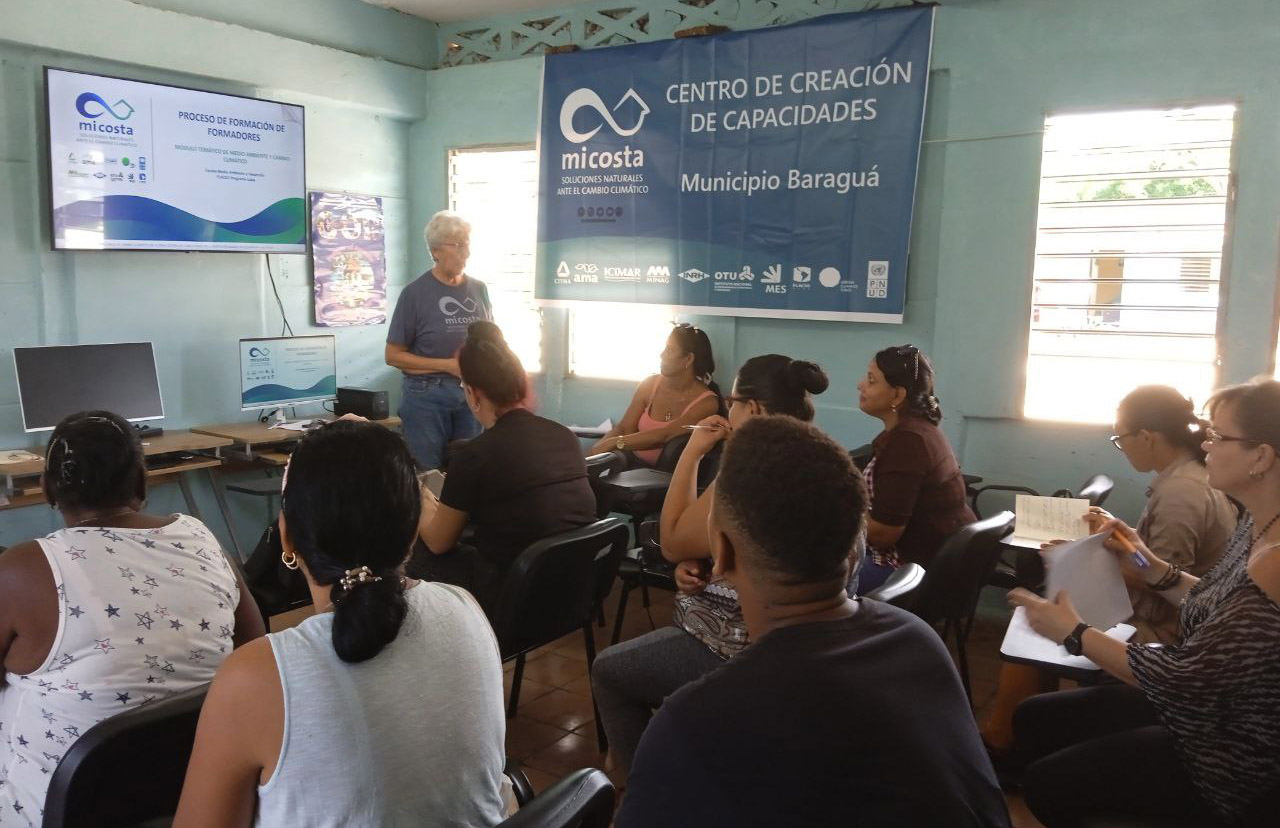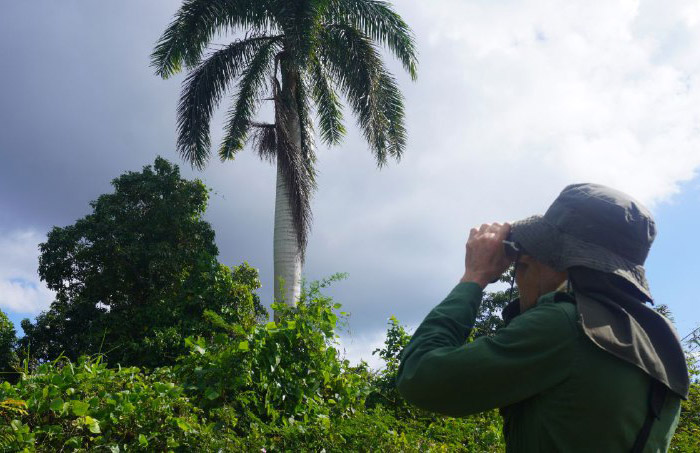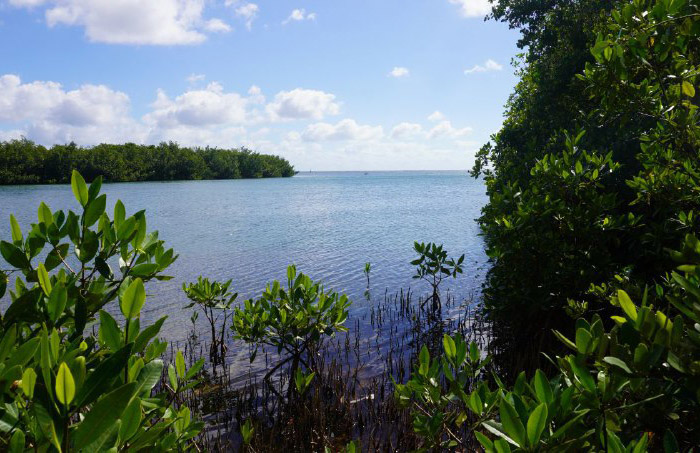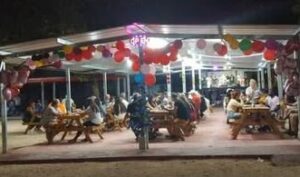With an integrated vision that includes disaster risk reduction, the province of Ciego de Avila advanced, during 2024, in the implementation of the State Plan to Confront Climate Change (Tarea Vida), with financial support from international organisations and the Cuban government.
The Territorial Delegation of the Ministry of Science, Technology and Environment (DT-Citma) referred to the leadership of the international project Mi Costa, which intervenes in areas of the southern coast of Avila to strengthen climate resilience, through the rehabilitation of wetlands and capacity building of local actors for the efficient management of the ecosystem.

Technical tasks aimed at recovering native vegetation and the development of an extensive training programme, from Citma’s capacity-building centres in the municipalities of Baraguá and Venezuela, and an annexed classroom in the community of Júcaro, marked the work of Mi Costa in the stage that is coming to an end.

The provincial coordination of this global initiative, financed by the Green Climate Fund, referred to training processes as fundamental to raise awareness of the impacts of climate change and the need to address them.
It also helped to promote the integration of institutions (political, economic and social) and the community into the restoration work and to engage them in sustainability.
Mi Costa maintains as principles the elimination of gender gaps and inequalities that accentuate the risks associated with climate change and limit the possibilities and full use of capacities for adaptability.
Meanwhile, the international Sustainable Tourism project focuses on the sun and beach destination Jardines del Rey to contribute to sustainability by incorporating the conservation and sustainable use of biodiversity and climate change mitigation in vulnerable marine-coastal zones.
These initiatives are implemented through the design and implementation of innovative management models, capacity building and financial mechanisms.
With monetary support from the Global Environment Facility, during 2024 expeditions were carried out to assess the state of biodiversity in the areas to be intervened, and diagnosed the state of hotel facilities to determine the possibilities of advancing in the implementation of quality standards that promote environmental respect and sustainable progress in this area.
Training processes, initiated in the phase just concluded, support compliance with the ISO 14 000, 14 001 and 50 001 quality standards – referring to environmental and energy management systems, respectively – in the hotels where the project intervenes.
In Cuba’s second largest sun and beach tourist destination, the Centre for Environmental Engineering and Biodiversity (Ciba), a scientific institution subordinated to the Environment Agency, concluded the project Rehabilitation of coastal dunes in Jardines del Rey: an alternative for disaster risk reduction and adaptation to climate change.

This environmental mission, implemented in the period 2022-2024, undertook actions aimed at conserving, maintaining and restoring, in a comprehensive manner, segments of sandy beaches.
More than 1,650 square metres of Las Coloradas beach, Cayo Coco, were rehabilitated with native vegetation, which was possible thanks to the production of more than 11,000 seedlings, using tubing technology and agro-ecological practices in the Ciba nursery.
In addition to this, biodiversity characterisation, the management of 132 cubic metres of biomass of exotic and invasive plants, the development of a methodological basis for determining risks in dune systems and the training of managers of six hotels were also carried out.
Ciba also concluded a project that laid the foundations for the integrated management of natural resources and adaptation to climate change in the Great Northern Wetlands of Ciego de Avila – an area of international importance, declared a Ramsar Site in 2002 – by representing the future climate in different scenarios and assessing its impact on the environment.
They also strengthened institutional capacities and the provision of information in order to achieve effectiveness and sustainability in the application of adaptation measures to the new scenarios.
The Euroclima Plus international project on risk reduction and adaptation to droughts and floods, for which the French Development Agency provided funding to acquire modern technology that facilitates real-time monitoring of climate variables and water resources, also produced positive results.
In addition to its contributions, studies on hazards, vulnerabilities and risks, and on the population’s perception of these natural disasters, which are exacerbated by current climatic conditions, were carried out, the results of which favour timely decision-making to minimise the economic and social impacts of these phenomena.
Donations from the People’s Republic of China made it possible to advance the transition to renewable energy sources (RES), with opportunities to reduce dependence on fossil fuels for electricity generation and to reduce greenhouse gas emissions into the atmosphere.
The changes in the energy matrix included the assembly and commissioning of the fourth solar photovoltaic park in the province, located in the municipality of Morón, which increased the electricity generation capacity to 15.75 megawatts.
At present, three more are being installed in the towns of Ciego de Avila, Baraguá and Venezuela, and there are plans to build the same number next year in order to advance towards energy sovereignty and continue promoting the use of affordable, non-polluting sources.
More than 29,800 inhabitants have benefited in the territory of Avila with the installation of 86 photovoltaic pumping systems that guarantee greater stability in the water supply for economic and social activities.
The agricultural sector continued to develop crops that are more resistant to the climatic conditions prevailing on the planet and with the challenge of producing more to satisfy, to a greater extent, the needs of the population and the economy.
The inauguration of a classroom-laboratory for good refrigeration and air conditioning practices at the Frank País García Polytechnic Institute in the municipality of Morón, where students are trained and professionals working in these activities are trained.
The educational and communicative actions carried out in Citma’s capacity building centres, educational institutions and workplaces, through social networks and in the media, were essential for raising awareness and mobilising the public to address climate change.
The country’s international commitments to the United Nations Framework Convention on Climate Change, the Paris Agreement and the targets, indicators and content of the Sustainable Development Goals, in particular number 13, which promotes the adoption of urgent measures to combat climate change and its effects, are relevant.
For Cuba this is a high-priority task, due to its status as a small island state located in the tropical region of the planet and considering that climate change aggravates the nation’s environmental problems, so that tackling it is crucial to achieving sustainable development.




